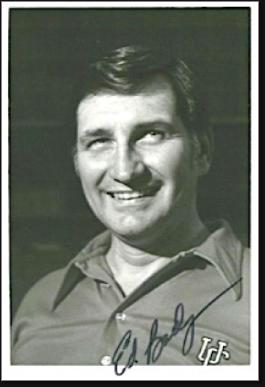
Sport: Basketball
Born: November 5, 1932
Town: West New York, New Jersey
Edward William Badger was born November 5, 1932 in West New York, NJ. A standout high-school basketball player in Hudson County, he was recruited to play at the University of Iowa and starred for the Hawkeyes in the early 1950s. Ed continued to play ball during a stint in the Air Force and then returned to Iowa City for his Masters degree. While there, he took a high-school coaching job and never looked back.
In 1958, Ed was named head coach at Wilbur Wright College in Chicago, a two-year school with some impressive alumni, including entertainers Kim Novak, Dennis Franz and Shecky Greene, columnist Mike Royko and Nobel-winning chemist Herbert Brown. During Ed’s 15 years coaching the Rams, his team became a basketball powerhouse, winning 25 or more games every season. In 1974 and again in 1975, the Rams were unbeaten and ranked #1 among the nation’s junior colleges.
Ed got his first taste of international competition in 1970 as an assistant at the World University Games and, in 1972, coached the Austrian national team, which did not qualify for the Munich Olympics. Ed was named head coach of the US team that competed in the 1973 World University Games, in Moscow. His star player was 19-year-old David Thompson, whom Ed ranked among the 10 best players in the world at the time—including the ABA and NBA. The team went 21–0 that summer and won the gold medal. Ed also coached teams of college players that played friendly exhibitions and held clinics in Eastern Europe during the Cold War.
Following this success, Ed was hired as a part-time assistant by Dick Motta of the Chicago Bulls. Ed joined the Chicago Bulls coaching staff as an assistant in 1975-76. In 1976–77, the Bulls made Ed the third head coach in team history, succeeding Motta and Johnny Kerr. Ed lasted two seasons with the Bulls, during which Chicago was basically a .500 team featuring Artis Gilmore as the main attraction.
In 1978, Ed was hired by the University of Cincinnati. However, six months after Ed took the Bearcats’ coaching reins, the program was put on probation for recruiting violations by his predecessor, Gail Catlett. This handicap and the headaches it created for his staff tempted Ed to resign, but he hung in and made the team competitive. His star player was Pat Cummings. In 1981, the Bearcats played an epic seven-overtime game, defeating Bradley 75–73 in a contest that took more than three hours to complete. They finished 16–13 that season, their best win total during Ed’s five years with the school.
Ed returned to the NBA in 1983 as an assistant with the Cleveland Cavaliers and then moved to the Celtics as Scouting Director in 1984. His analysis of talent—on the Boston roster and the team’s opponents—helped the Celts win the NBA title in 1986. In 1988, Ed joined the expansion Charlotte Hornets and also worked for the Hawks, Pacers, Heat, 76ers and Timberwolves. He retired after the 2002–03 season, but still took special assignments from time to time.